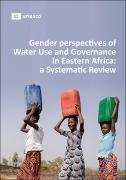Uganda National Commission for UNESCO: Recent submissions
Now showing items 21-40 of 234
-
Should we be afraid of neuroscience?
(UNESCO, 2022)In the field of neuroscience, reality has already surpassed fiction. Who could have imagined that it would one day be possible to implant false memories in an animal's brain, or to dictate a text to a computer by using ... -
Restoring biodiversity, reviving life
(UNESCO, 2021)Year after year, scientific studies are condemned to chronicle the sixth mass extinction - the decline of living organisms, the loss of species, the over-exploitation of resources, and the degradation of natural ... -
The 20s: Really the best age to be?
(UNESCO, 2021)Being young can be exciting and fun, but it is always challenging. Completing your studies, finding a job, finding somewhere to live-in short, taking the first steps of the rest of your life. If it was not easy before the ... -
The ocean: time to turn the tide
(UNESCO, 2021)Less than twenty per cent of the world's oceans have been explored so far. That is not a lot. But it is enough for us to know that the oceans are threatened by global warming, acidification, and pollution. Coral bleaching ... -
General Guidelines for the Implementation of Sustainability in Higher Education Institutions
(UNESCO, 2023)The 2030 Agenda is underpinned by the UN Sustainable Development Goals (SDGs), which are the common goals that humanity has chosen for itself through the agreement of all the United Nations Member States. The SDGs are ... -
Reinventing cities
(UNESCO, 2019)In this issue Cities have always been centres of power, attractiveness and prosperity. But the frenetic urbanization of recent decades is jeopardizing their historical function as melting pots that integrate and absorb ... -
Artificial intelligence: the promises and the threats
(UNESCO, 2018)Towards a global code of ethics for artificial intelligence research There have been spectacular advances in the field of artificial intelligence (Al) in recent years, leading to inventions that we had never thought ... -
Gender perspectives of Water Use and Governance in Eastern Africa: a Systematic Review
(UNESCO, 2023)This report examines the extent to which water initiatives (policies, strategies, plans, projects and programmes) have integrated a gender lens in thirteen countries in Eastern Africa (namely, Comoros, Djibouti, Eritrea, ... -
Welcome to the Anthropocene!
(UNESCO, 2018)Waiting for the heroes As you begin reading this April-June 2018 issue of the Courier, you are living in the Phanerozoic eon, the Cainozoic era, the Quaternary period and the Holocene epoch. These are all subdivisions of ... -
Report on the Stakeholders Workshop on Education for All
(UNATCOM, 2009-10)Introduction The Workshop Moderator Ms Sarah Nambuya started the workshop by welcoming the participants. She highlighted that the purpose of the workshop was to seek the stakeholders' views in the Education Sector on how ... -
State of Heritage Education in Uganda
(UNATCOM, 2011)EXECUTIVE SUMMARY In a critical reflective perspective, we live in an age of extinction in which we are driving our cultural and natural heritage heritages that have been sustaining humanity and planet earth back to the ... -
Report on the Support Supervision of ASPNET Schools
(UNATCOM, 2011)1.0 BACKGROUND The UNESCO Associated Schools Project Network (ASP-net) member schools held a work camp held at Mt. St Mary's Namagunga 2010 at which the ASP-net Schools Coordinators recommitted themselves to implementing ... -
Report on the Support Supervision of ASPNET Schools
(UNATCOM, 2015)1.0. Background Founded in 1953, the UNESCO Associated Schools Project Network (ASPnet), commonly referred to as UNESCO Associated Schools, is a global network of 9900 educational institutions in 180 countries. Member ... -
Human Resource Capacity Development
(East Africa National Commissions Capacity Building Programme, 2015)1. Background to the Manual In the framework of priority Africa in UNESCO and of strengthening the North-South-South- cooperation between National Commissions for UNESCO (NATCOMS), the German Commission for UNESCO supported ... -
Poverty Eradication through Education
(UNESCO, 2003) -
Terminal Evaluation of the Capacity Building Program (CBP) for East African National Commissions for UNESCO 2009-2012
(UNATCOM, 2013)National Commissions for UNESCO (NATCOMS) are the bridges between UNESCO and Member States. They vary in formation, capacity and ability. Therefore, their ability to perform their important roles and responsibilities also ... -
Some Common Traditional Values among Ugandans
(UNATCOM, 2012)The Uganda National Commission for UNESCO commissioned a study to establish common traditional values among Ugandan societies with overall aim of documenting common ones that could be enlisted as Ugandan ethos for guiding ... -
Promotion of a Gender Responsive Teaching and Learning Environment in Secondary Schools
(UNATCOM, 2020)Introduction We received support from UNESCO to implement a participatory programme on promotion of a gender responsive teaching and learning environment in secondary schools. This report is an output of what transpired ... -
Preservation of Documentary Heritage
(UNATCOM, 2011-02)The study aimed at assessing the status of safeguarding and preserving the documentary heritage in Uganda and its placement within the Memory of the World (Mow) Program. Its objectives were: 1. To assess the current state ... -
Manual for Enhancing Production and Marketing Skills in Cultural and Creative Industries of Uganda.
(UNATCOM, 2021)This Manual is the result of a consultancy undertaking together with crafts' training workshops arranged among conglomeration of crafters of cultural and creative industries of eastern, western and northern Uganda with ...





















